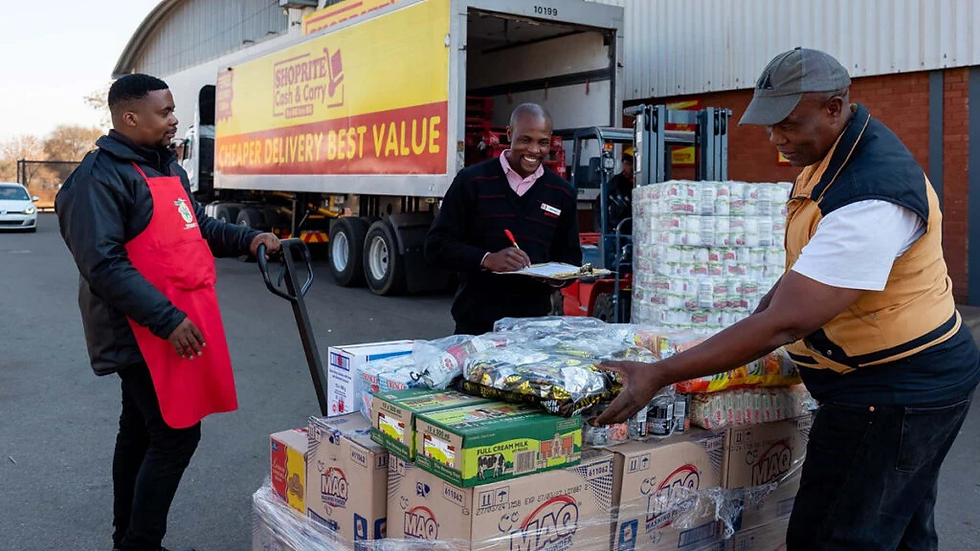South Africa: R268 billion retail giant taking on Shoprite, Pick n Pay and SPAR
- DRC Discount Retail Consulting GmbH

- Sep 26, 2025
- 3 min read
South Africa’s formal independent retail and wholesale sector is a R268 billion juggernaut, with it increasingly becoming an attractive shopping destination for households. The sector has historically catered to independent informal traders, particularly spaza shop owners, by selling in bulk in the typical cash and carry format. However, in recent years, households have shifted their shopping habits to include more visits to independent wholesalers.
This growth is largely driven by South African consumers’ search for value, with wholesalers offering products in bulk at lower prices than traditional retailers. South Africa’s formal independent retail and wholesale sector is now valued at R268 billion, accounting for nearly a third of the country’s FMCG market, according to the latest Trade Intelligence Formal Independent Channel Report. This sector is a critical supply line for informal traders and an increasingly attractive shopping destination for households, the research firm said.
Overall, the formal independent sector comprises wholesalers, hybrids, hypermarkets and supermarkets that operate outside of JSE-listed corporate chains.
Trade Intelligence data shows that 11% of South African households shop in the sector – the same reach as Clicks, nearly four times Woolworths, and not far off Checkers at 18%.
With continuous investment in store layouts, merchandising and service, the old perception of ‘cash & carry’ as purely trader-focused is fading fast, Trade Intelligence said. A large portion of this channel is made up of wholesalers, hybrids, and hypermarkets.
Independent wholesalers, who sell in bulk to businesses such as hospitality and informal traders and hybrids, who serve both traders and household shoppers, are a key route into the informal economy.
“Independent wholesale is key to the economy because it is the supply chain that feeds the informal market, from tuckshops and spazas to schools and midi-wholesalers,” Unitrade Management Services (UMS) CEO Jad Pereira said.
UMS is South Africa’s largest network of independent wholesalers and retailers supporting more than 300 stores nationwide. “It’s been proven to be the most effective supply chain in the country, and corporates have tried it before without success,” Pereira said. According to Trade Intelligence, 95% of informal traders source their stock through independent wholesalers, making the sector a vital enabler of entrepreneurship and employment.
Taking on traditional retailers
South African households are under increasing financial pressure, with some making the shift towards shopping at wholesalers rather than traditional retailers. There has also been a noticeable rise in the popularity of value retailers from Shoprite’s Usave brand to Boxer and Best Before. Shoppers under economic pressure are increasingly turning to independent hypermarkets and wholesalers for value, Trade Intelligence said. This is accelerating the rise of hybrid wholsealers, which now make up 92% of the wholesale and hyper footprint. At the same time, independents are stepping into corporate retail territory with supermarket-style formats.
“Many independents now offer full fresh departments, bakeries and butcheries, alongside bulk ranges,” Trade Intelligence insights lead Andrea Slabber said. “They’re evolving into true one-stop destinations, which makes them more attractive not only to traders but also to everyday household shoppers. Our independent retailers have upscaled dramatically,” “From product range to pricing, quality and store experience, they now rival and often outperform corporate stores. And because independents are agile, they can change formats, pack sizes or promotions overnight, something larger groups simply can’t do,” Pereira said.
That agility is matched by a deep local focus, with independents looking to beat our national chains by offering specific products to particular communities. Independent retailers stock products from local farmers and smaller suppliers who cannot scale into corporate chains.
“The sector’s role is more than transactional. It keeps prices competitive, creates access for emerging suppliers, and anchors communities with both jobs and social support,” Slabber said. “For brands, it’s also a channel where in-store activations and direct shopper engagement are easier to execute than in corporates.”
Looking ahead, Pereira is upbeat. “If we can be successful in an economy with 42% unemployment and high crime, just imagine the upside when conditions improve. Growth prospects for independents are massive.”
Read more: South Africa’s R268 billion retail giant taking on Shoprite, Pick n Pay and SPAR – Daily Investor

#smartdiscount #rsa #southafrica #independent #growth #drc #discount #retail #consulting #harddiscount #hd #discountretail #discountretailconsulting #retailconsulting #google #Shoprite #PicknPay #SPAR




Comments